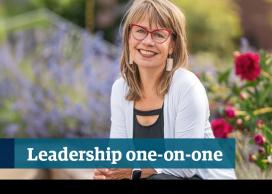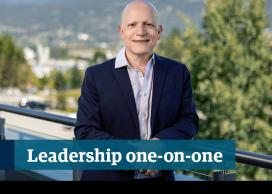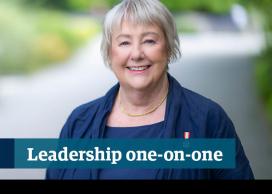From Australia originally, Dr. Emma Cunliffe came to UBC in 2002 to do a Master’s in Law. She only intended to stay for a year, but her master’s turned into a PhD and eventually a faculty position at the Peter A. Allard School of Law. In January 2017, she started a two-year term in a completely new capacity — that of senior advisor to President and Vice-Chancellor, Professor Santa Ono.
Q1. What quality do you most admire in a leader?
EC: Having the capacity to bring out the best in those around you.
Q2. What makes you laugh?
EC: My dog! Scraps (a poodle-retriever mix, named after a dog in a Terry Pratchett novel) is a complete clown, and is well known at the Allard School of Law.
I also belong to a run club, and my friends there always keep me laughing. Often, when I need to laugh at myself, they find a way to help me see the funny side! It’s a wonderful community.
Q3. How do you like to recharge?
EC: Being outdoors recharges me. I’m a very keen hiker, snowshoer and all-round outdoors enthusiast, so any time I get a free day, I’m up in the mountains. My husband and I rarely holiday anywhere else because there’s so much to see and do here in British Columbia. We love living here!
Q4. Who inspires you, and why?
EC: One of my greatest inspirations is Lynn Smith. She is a former British Columbia Supreme Court Judge and former dean of the Allard School of Law. I’ve been privileged to work with her quite closely in some of the judicial education work that I do.
Lynn’s life’s work has been devoted to according all people the dignity and support that will allow them to realize their vision of a life well lived. And whether it’s in her judicial decisions or in her academic work, her concern for the welfare of others shines through. She does her work with great integrity.
Q5. What first drew you to UBC?
EC: When I was doing my law degree at the University of Melbourne, UBC was held out as a beacon in social justice law. We studied the extraordinary work of UBC’s scholars and Canadian law was often favourably compared to the High Court of Australia’s approach to issues such as equality and diversity.
I worked as a lawyer for a few years after graduation, but eventually realized that my heart was in academia. I applied to do my master’s degree at UBC, and worked with the scholars whose research I had studied during my undergrad, such as Susan Boyd, Christine Boyle and Wes Pue. I’ve been a UBC devotee ever since!
Q6. What are you responsible for in your new role?
EC: My primary responsibility for this next year is leading UBC’s strategic planning process, in particular to engage widely with UBC’s community. A lot of my work involves sitting down and having conversations with really passionate people from across the organization, about what they’re doing, what they’d like UBC to be, and how the institution can best support them in their work.
Once we’ve settled collectively on our priorities, my role will shift and I will focus on how UBC will deliver on those priorities.
Q7. As the new strategic plan is developed, how will we ensure it reflects UBC’s multiple communities?
EC: We ran an initial survey, inviting the UBC community to share their thoughts on a number of questions, including how best to engage with as many people as possible in the planning process. The responses we had were extremely thoughtful and have been instrumental in shaping the process from here.
Moving forward, we’ll have a steering committee that will be comprised of broad representation of faculty, staff, students and community, all of whom were selected because they are representative of the breadth and diversity of UBC.
Essentially, the process will be focused on setting visions and priorities for the institution, and once we feel we’ve got a community consensus on those, we will think about how we can shape UBC’s future. There will be opportunities for community consultation and expert input along the way.
Q8. Why does the new strategic plan matter to the university?
EC: UBC has achieved an extraordinary amount in its first 100 years, and we’ve grown a great deal, especially in the past 25 years. The questions that arise for us now are, given our rapid growth and success, how do we make sure we capture and share the benefits of our brilliant research and the insights of our talented people? Also, how do we ensure that we are supporting all the wonderful people who study, work and live here to achieve their fullest potential?
Q9. What do you value in your colleagues?
EC: I really value the passion my colleagues bring to their work. It is really inspiring to be surrounded by people who do the work they do because they care so deeply about it. I believe it must be an institutional priority to make sure our people — faculty, staff and students — are supported in doing work they love.
Being able to share a laugh and work through difficult moments together as a team is a quality that lifts ordinary days into something special.
This is an aspect of my new role in the President’s Office that I’m especially enjoying — working in a team environment, where we’re pulling towards a collective goal.
Q10. What is the best advice you were ever given?
EC: When I started my first job as a lawyer, my dad said to me, “your career is a marathon, not a sprint.” This was great advice, because I was really passionate about my work and wanted to do more of it. But it helped me understand that in order to have a long and fulfilling career, I need to marshal my energies and take care of myself.
Q11. If you could have a super power, what would it be?
EC: Right now? The power to play with time! I would really like to have more than 24 hours in a day. Please don’t interpret this as a complaint about being busy. It’s because there are so many fun, challenging and inspiring things on my plate and I would like more time to do them!
Q12. Who is your favourite writer?
EC: Miriam Toews is my favourite Canadian writer, especially All My Puny Sorrows and A Complicated Kindness. Beyond Canada, I love Marilynne Robinson, who wrote the Gilead, Home and Lila trilogy. These books are written from the various but overlapping perspectives of protagonists who live in a small town in the American Midwest. They illustrate the inherent dignity and struggles of ordinary lives.
Q13. For you, what makes UBC different?
EC: One thing that distinguishes UBC — and that I care deeply about — is our widespread efforts to understand and remake our role as a public research university in a province where European settlement is comparatively recent and Indigenous cultures have remained resilient despite the deep harms of colonialism. Recognising our geographical location in a place where truth and reconciliation are very much unfinished business, UBC has begun to grapple with how we can build positive and mutually beneficial relationships with Indigenous communities and with how we can share the benefit of our work broadly. We have certainly got more work to do, individually and institutionally, in this regard, but I am heartened by the sincere commitment to reconciliation that I see and hear on our campuses. As an immigrant to Canada, I consider it a privilege to contribute to that work.
Published: February 1, 2017
Interviewed by: Megan Czerpak, UBC Internal Communications



